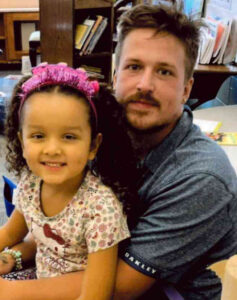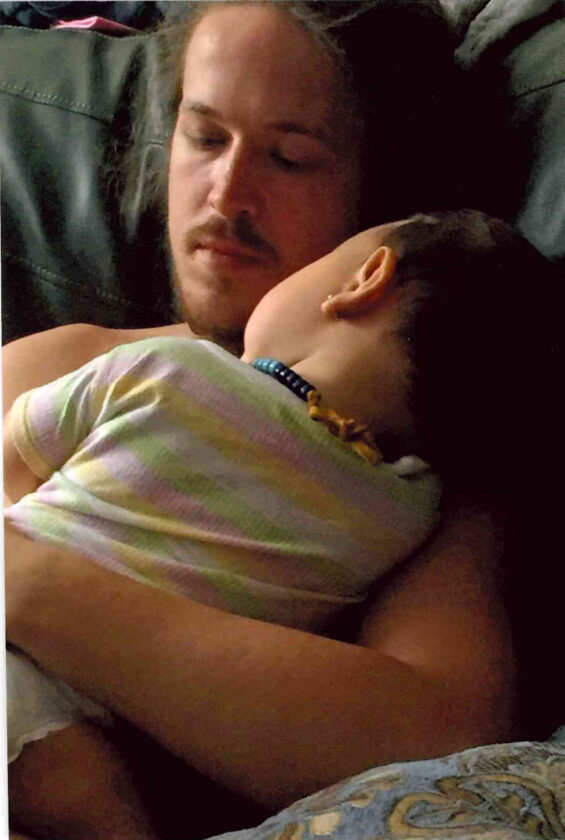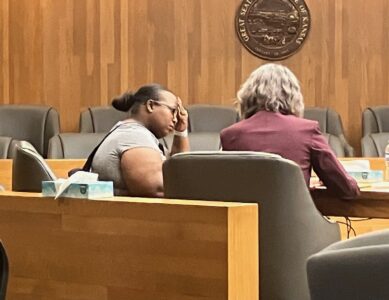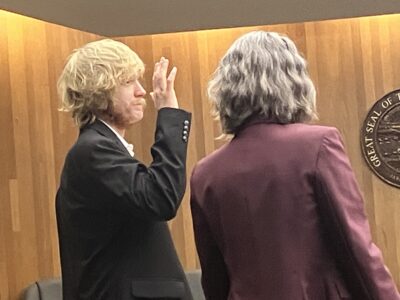Family of Lawrence man who died of fentanyl overdose pleased that dealer got maximum sentence for voluntary manslaughter

photo by: Contributed
David Johnson poses with his daughter.
The family of a 31-year-old father who died of a fentanyl overdose said on Friday that they were pleased that the judge heard their pleas for the maximum prison sentence for the “murderer” who sold the drug.
Kristopher Koby Alaniz, 36, of Lawrence, pleaded guilty in December 2024 to one count of voluntary manslaughter and one count of possession of paraphernalia, both felonies, in connection with the overdose death of David Joseph Johnson on April 9, 2024, as the Journal-World reported.
“I am thankful that the judge heard our pleas,” Johnson’s mother, Corinna Johnson, told the Journal-World after the sentence was read. She had spoken for over 30 minutes to tell Judge Sally Pokorny exactly how Johnson’s death had affected the family, especially how it affected Johnson’s 7-year-old daughter. Before she and other family members spoke they placed dozens of photos of Johnson and his daughter in Pokorny’s view.

photo by: Douglas County Sheriff’s Office
Kristopher Koby Alaniz
Pokorny ultimately sentenced Alaniz to 102 months, or 8.5 years, in prison on the charges Friday, giving him the maximum sentence for the manslaughter charge, in accordance with state law based on Alaniz’s criminal history. She sentenced him to 92 months for manslaughter and 10 months for the paraphernalia charge.
“Kristopher Koby Alaniz murdered my son and destroyed my entire family,” she said as she wept.
She said that after Johnson died, his young daughter didn’t speak for days. She said Johnson’s daughter would experience the trauma of losing her father at every milestone in her life, from soccer games to dancing at traditional pow-wows. She said Johnson had embraced his daughter’s Native American heritage and encouraged her to always express herself.
“On her wedding day she will be the happiest she has ever been but also the saddest as she looks to the crowd wishing to see her father,” Corinna said.
The day before he died, Corinna said, she and her son lay in the grass watching an eclipse together. That night she told Johnson goodnight, but to this day she can’t remember if she took the extra step of telling him she loved him.
“How was I to know that was the last time I would speak to him?” Corinna said.
She said not only was her own family destroyed by Alaniz, but his was too.
“My hope for you (Alaniz) is to carry this burden with you forever getting heavier and heavier with each breath you take,” Corinna said.
She begged Pokorny to give Alaniz the maximum sentence. She said that Alaniz was wearing an ankle monitor at the time he gave Johnson the fentanyl, which made it clear Alaniz thought he was “above the law.”

photo by: Contributed
David Johnson holds his young daughter.
Johnson’s grandmother also spoke at the hearing and said that Johnson loved taking his daughter on outings to places like Legoland or Clinton Lake. She said they would walk the lake shores and campgrounds with a metal detector looking for “treasure,” though usually they would come home with a lot of trash. She said Johnson taught his daughter to collect the garbage to help clean up the lake.
“You take the good with the bad,” the grandmother said.
She said Johnson’s daughter called him the “best dad” and is always looking for him to come back. She said the girl understood death but is still waiting for Johnson to return.
“This was her daddy. Daddies aren’t supposed to go away,” the grandmother said.
She also asked Pokorny to sentence Alaniz to the maximum penalty.
A family friend who said he had known Johnson since he was young told the court that he wished he could have been a father like the one Johnson was to his daughter.
“I love how he embraced his daughter’s heritage. Everything was about family,” the man said.
He said that Alaniz knew Johnson well, specifically how Johnson struggled with addiction.
“(Alaniz) kept pestering him. Dangling it in front of him. An addict will relapse with that temptation. (Alaniz) continued to text (Johnson) after his death but it was the sheriff’s deputies he was messaging,” the man said.
The man asked Pokorny to give Alaniz consecutive back-to-back sentences.
“That’s the only way we will beat this fentanyl problem, get dealers off the street,” the man said.
Deputy District Attorney David Greenwald said that while Alaniz pleaded guilty as part of a plea agreement, he deserved no further consideration from the court. He asked that Alaniz’s sentences be consecutive.
He said that Alaniz was dealing with the most dangerous form of fentanyl, a pure powder, even two grains of which could be deadly. He said that an aggravating factor in the case was that Alaniz targeted Johnson knowing he was a recovering addict.
“He knowingly sold possibly the most deadly drug we have ever seen. The only way to keep the community safe is to take him out of it for as long as possible,” Greenwald said.
Alaniz spoke briefly. He said that Johnson’s family had treated him like one of their own.
“I made a horrible mistake that killed my dear friend,” Alaniz said.
Alaniz also apologized to the community at large for being a “menace and an addict.”
Alaniz’s attorney, Angelo Panas, asked the court to grant Alaniz leniency and less prison time so Alaniz could get out and get treatment for drug addiction. He said Alaniz started drinking at a young age and became addicted to drugs after an injury.
Pokorny said that she was swayed by the comments from Johnson’s family.
“The reality of this case is devastating,” Pokorny said.
She said she understood Corinna’s pain and that a child is not supposed to die before the parent. She said that while Corinna may be alarmed that people keep asking her “how she’s doing,” she should be encouraged that those around her aren’t ignoring the “elephant in the room” and they acknowledge Johnson’s death.
She said she sentenced Alaniz to the maximum penalty because not only had prior attempts at reformation failed but also because Alaniz and Johnson had struggled with addiction together.
“I am particularly struck by the fact you knew how vulnerable he was,” Pokorny said.
Alaniz’s plea agreement with the state dismissed multiple felony cases involving drug sales and possession, according to court records. He was previously convicted of two counts of misdemeanor domestic battery for which he was on probation at the time of Johnson’s death and had violated that probation and was placed on GPS monitoring in February 2024, two months before Johnson’s death.
Alaniz has a prior conviction for three felony counts of distribution of a controlled substance in 2009 in Douglas County, according to court records.







